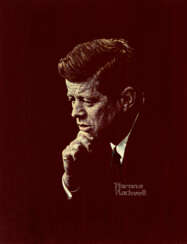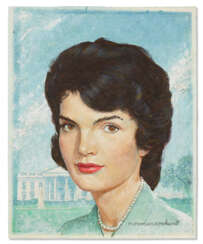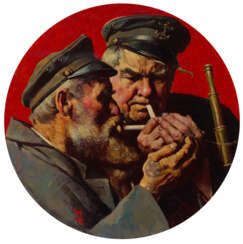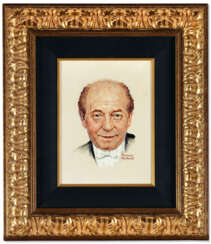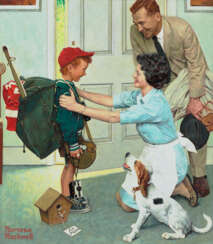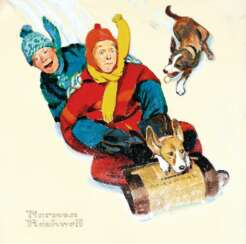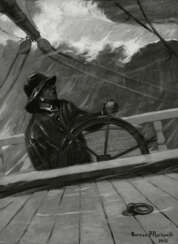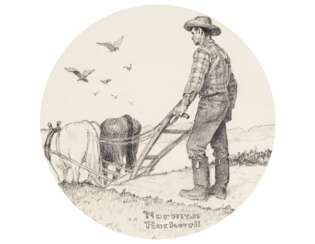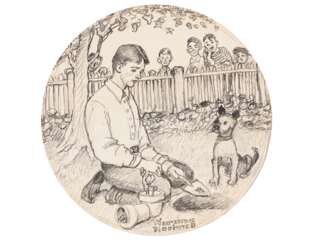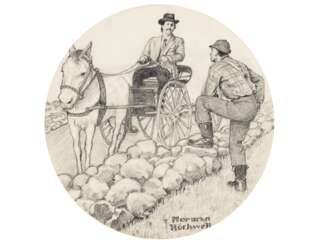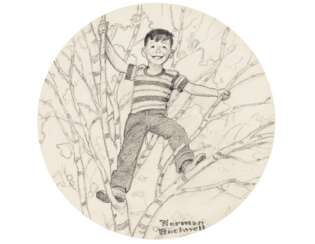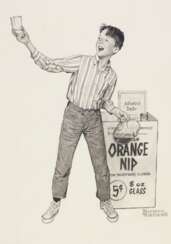Norman Rockwell (1894 - 1978) — Auction price
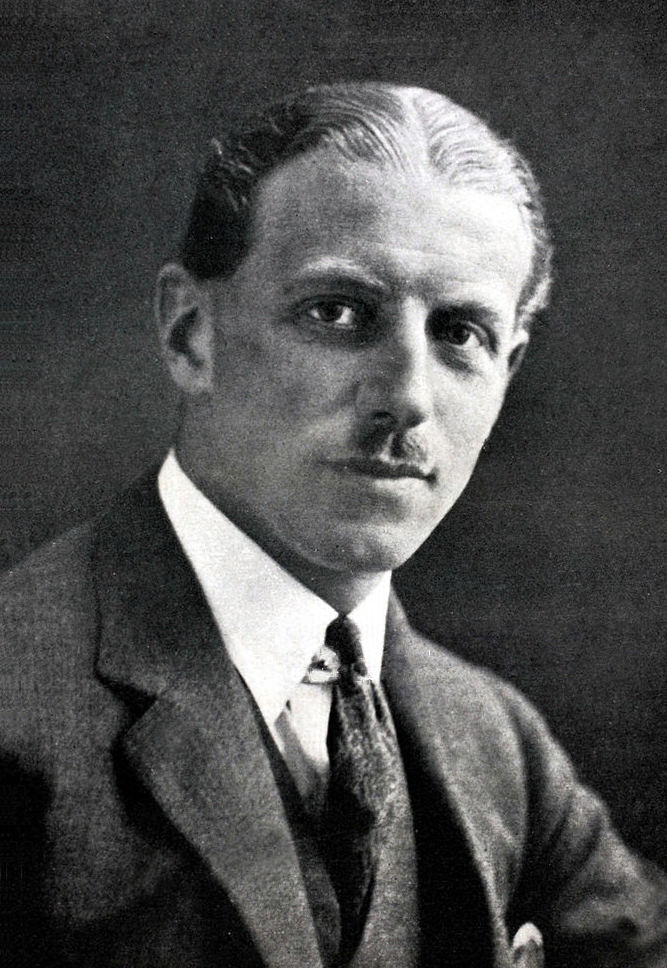
Norman Rockwell was an American illustrator and painter, renowned for his vivid and humane portrayal of American life. Born in New York City in 1894, Rockwell showed artistic promise from an early age, which led him to leave high school and pursue art full-time at prestigious institutions like the National Academy of Design and the Art Students League.
Rockwell's career blossomed early; by the age of 22, he had painted his first cover for The Saturday Evening Post, a relationship that would last nearly five decades and produce 323 covers. His depictions of everyday life and pivotal American moments captured the spirit of the nation.
Perhaps his most significant works were the "Four Freedoms" series, inspired by President Franklin D. Roosevelt's vision of a world founded on four essential human freedoms. These paintings not only graced the covers of The Saturday Evening Post but also played a crucial role in the U.S. war effort during World War II, raising over $130 million through the sale of war bonds.
In his later years, Rockwell did not shy away from addressing social issues. His move to Look magazine allowed him to focus on subjects such as civil rights and poverty, marking a significant shift from his earlier work. "The Problem We All Live With," depicting Ruby Bridges integrating a New Orleans school, remains a powerful symbol of the Civil Rights Movement and showcases Rockwell's ability to engage with contemporary social issues through his art.
For those interested in exploring Rockwell's extensive body of work, the Norman Rockwell Museum in Stockbridge, Massachusetts, holds the largest collection of his original art, providing insights into his artistic journey and the historical context of his works.
If you're keen on further updates and insights into the world of Norman Rockwell, consider signing up for our newsletter. This subscription will keep you informed about new exhibitions, sales, and auction events related to Rockwell's art.
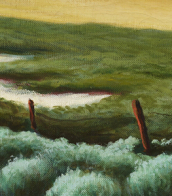

Norman Rockwell was an American illustrator and painter, renowned for his vivid and humane portrayal of American life. Born in New York City in 1894, Rockwell showed artistic promise from an early age, which led him to leave high school and pursue art full-time at prestigious institutions like the National Academy of Design and the Art Students League.
Rockwell's career blossomed early; by the age of 22, he had painted his first cover for The Saturday Evening Post, a relationship that would last nearly five decades and produce 323 covers. His depictions of everyday life and pivotal American moments captured the spirit of the nation.
Perhaps his most significant works were the "Four Freedoms" series, inspired by President Franklin D. Roosevelt's vision of a world founded on four essential human freedoms. These paintings not only graced the covers of The Saturday Evening Post but also played a crucial role in the U.S. war effort during World War II, raising over $130 million through the sale of war bonds.
In his later years, Rockwell did not shy away from addressing social issues. His move to Look magazine allowed him to focus on subjects such as civil rights and poverty, marking a significant shift from his earlier work. "The Problem We All Live With," depicting Ruby Bridges integrating a New Orleans school, remains a powerful symbol of the Civil Rights Movement and showcases Rockwell's ability to engage with contemporary social issues through his art.
For those interested in exploring Rockwell's extensive body of work, the Norman Rockwell Museum in Stockbridge, Massachusetts, holds the largest collection of his original art, providing insights into his artistic journey and the historical context of his works.
If you're keen on further updates and insights into the world of Norman Rockwell, consider signing up for our newsletter. This subscription will keep you informed about new exhibitions, sales, and auction events related to Rockwell's art.
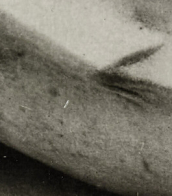

Norman Rockwell was an American illustrator and painter, renowned for his vivid and humane portrayal of American life. Born in New York City in 1894, Rockwell showed artistic promise from an early age, which led him to leave high school and pursue art full-time at prestigious institutions like the National Academy of Design and the Art Students League.
Rockwell's career blossomed early; by the age of 22, he had painted his first cover for The Saturday Evening Post, a relationship that would last nearly five decades and produce 323 covers. His depictions of everyday life and pivotal American moments captured the spirit of the nation.
Perhaps his most significant works were the "Four Freedoms" series, inspired by President Franklin D. Roosevelt's vision of a world founded on four essential human freedoms. These paintings not only graced the covers of The Saturday Evening Post but also played a crucial role in the U.S. war effort during World War II, raising over $130 million through the sale of war bonds.
In his later years, Rockwell did not shy away from addressing social issues. His move to Look magazine allowed him to focus on subjects such as civil rights and poverty, marking a significant shift from his earlier work. "The Problem We All Live With," depicting Ruby Bridges integrating a New Orleans school, remains a powerful symbol of the Civil Rights Movement and showcases Rockwell's ability to engage with contemporary social issues through his art.
For those interested in exploring Rockwell's extensive body of work, the Norman Rockwell Museum in Stockbridge, Massachusetts, holds the largest collection of his original art, providing insights into his artistic journey and the historical context of his works.
If you're keen on further updates and insights into the world of Norman Rockwell, consider signing up for our newsletter. This subscription will keep you informed about new exhibitions, sales, and auction events related to Rockwell's art.
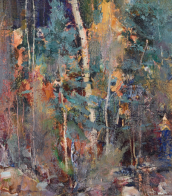

Norman Rockwell was an American illustrator and painter, renowned for his vivid and humane portrayal of American life. Born in New York City in 1894, Rockwell showed artistic promise from an early age, which led him to leave high school and pursue art full-time at prestigious institutions like the National Academy of Design and the Art Students League.
Rockwell's career blossomed early; by the age of 22, he had painted his first cover for The Saturday Evening Post, a relationship that would last nearly five decades and produce 323 covers. His depictions of everyday life and pivotal American moments captured the spirit of the nation.
Perhaps his most significant works were the "Four Freedoms" series, inspired by President Franklin D. Roosevelt's vision of a world founded on four essential human freedoms. These paintings not only graced the covers of The Saturday Evening Post but also played a crucial role in the U.S. war effort during World War II, raising over $130 million through the sale of war bonds.
In his later years, Rockwell did not shy away from addressing social issues. His move to Look magazine allowed him to focus on subjects such as civil rights and poverty, marking a significant shift from his earlier work. "The Problem We All Live With," depicting Ruby Bridges integrating a New Orleans school, remains a powerful symbol of the Civil Rights Movement and showcases Rockwell's ability to engage with contemporary social issues through his art.
For those interested in exploring Rockwell's extensive body of work, the Norman Rockwell Museum in Stockbridge, Massachusetts, holds the largest collection of his original art, providing insights into his artistic journey and the historical context of his works.
If you're keen on further updates and insights into the world of Norman Rockwell, consider signing up for our newsletter. This subscription will keep you informed about new exhibitions, sales, and auction events related to Rockwell's art.
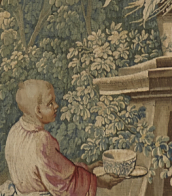

Norman Rockwell was an American illustrator and painter, renowned for his vivid and humane portrayal of American life. Born in New York City in 1894, Rockwell showed artistic promise from an early age, which led him to leave high school and pursue art full-time at prestigious institutions like the National Academy of Design and the Art Students League.
Rockwell's career blossomed early; by the age of 22, he had painted his first cover for The Saturday Evening Post, a relationship that would last nearly five decades and produce 323 covers. His depictions of everyday life and pivotal American moments captured the spirit of the nation.
Perhaps his most significant works were the "Four Freedoms" series, inspired by President Franklin D. Roosevelt's vision of a world founded on four essential human freedoms. These paintings not only graced the covers of The Saturday Evening Post but also played a crucial role in the U.S. war effort during World War II, raising over $130 million through the sale of war bonds.
In his later years, Rockwell did not shy away from addressing social issues. His move to Look magazine allowed him to focus on subjects such as civil rights and poverty, marking a significant shift from his earlier work. "The Problem We All Live With," depicting Ruby Bridges integrating a New Orleans school, remains a powerful symbol of the Civil Rights Movement and showcases Rockwell's ability to engage with contemporary social issues through his art.
For those interested in exploring Rockwell's extensive body of work, the Norman Rockwell Museum in Stockbridge, Massachusetts, holds the largest collection of his original art, providing insights into his artistic journey and the historical context of his works.
If you're keen on further updates and insights into the world of Norman Rockwell, consider signing up for our newsletter. This subscription will keep you informed about new exhibitions, sales, and auction events related to Rockwell's art.
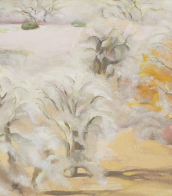

Norman Rockwell was an American illustrator and painter, renowned for his vivid and humane portrayal of American life. Born in New York City in 1894, Rockwell showed artistic promise from an early age, which led him to leave high school and pursue art full-time at prestigious institutions like the National Academy of Design and the Art Students League.
Rockwell's career blossomed early; by the age of 22, he had painted his first cover for The Saturday Evening Post, a relationship that would last nearly five decades and produce 323 covers. His depictions of everyday life and pivotal American moments captured the spirit of the nation.
Perhaps his most significant works were the "Four Freedoms" series, inspired by President Franklin D. Roosevelt's vision of a world founded on four essential human freedoms. These paintings not only graced the covers of The Saturday Evening Post but also played a crucial role in the U.S. war effort during World War II, raising over $130 million through the sale of war bonds.
In his later years, Rockwell did not shy away from addressing social issues. His move to Look magazine allowed him to focus on subjects such as civil rights and poverty, marking a significant shift from his earlier work. "The Problem We All Live With," depicting Ruby Bridges integrating a New Orleans school, remains a powerful symbol of the Civil Rights Movement and showcases Rockwell's ability to engage with contemporary social issues through his art.
For those interested in exploring Rockwell's extensive body of work, the Norman Rockwell Museum in Stockbridge, Massachusetts, holds the largest collection of his original art, providing insights into his artistic journey and the historical context of his works.
If you're keen on further updates and insights into the world of Norman Rockwell, consider signing up for our newsletter. This subscription will keep you informed about new exhibitions, sales, and auction events related to Rockwell's art.
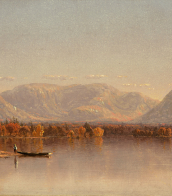

Norman Rockwell was an American illustrator and painter, renowned for his vivid and humane portrayal of American life. Born in New York City in 1894, Rockwell showed artistic promise from an early age, which led him to leave high school and pursue art full-time at prestigious institutions like the National Academy of Design and the Art Students League.
Rockwell's career blossomed early; by the age of 22, he had painted his first cover for The Saturday Evening Post, a relationship that would last nearly five decades and produce 323 covers. His depictions of everyday life and pivotal American moments captured the spirit of the nation.
Perhaps his most significant works were the "Four Freedoms" series, inspired by President Franklin D. Roosevelt's vision of a world founded on four essential human freedoms. These paintings not only graced the covers of The Saturday Evening Post but also played a crucial role in the U.S. war effort during World War II, raising over $130 million through the sale of war bonds.
In his later years, Rockwell did not shy away from addressing social issues. His move to Look magazine allowed him to focus on subjects such as civil rights and poverty, marking a significant shift from his earlier work. "The Problem We All Live With," depicting Ruby Bridges integrating a New Orleans school, remains a powerful symbol of the Civil Rights Movement and showcases Rockwell's ability to engage with contemporary social issues through his art.
For those interested in exploring Rockwell's extensive body of work, the Norman Rockwell Museum in Stockbridge, Massachusetts, holds the largest collection of his original art, providing insights into his artistic journey and the historical context of his works.
If you're keen on further updates and insights into the world of Norman Rockwell, consider signing up for our newsletter. This subscription will keep you informed about new exhibitions, sales, and auction events related to Rockwell's art.


Norman Rockwell was an American illustrator and painter, renowned for his vivid and humane portrayal of American life. Born in New York City in 1894, Rockwell showed artistic promise from an early age, which led him to leave high school and pursue art full-time at prestigious institutions like the National Academy of Design and the Art Students League.
Rockwell's career blossomed early; by the age of 22, he had painted his first cover for The Saturday Evening Post, a relationship that would last nearly five decades and produce 323 covers. His depictions of everyday life and pivotal American moments captured the spirit of the nation.
Perhaps his most significant works were the "Four Freedoms" series, inspired by President Franklin D. Roosevelt's vision of a world founded on four essential human freedoms. These paintings not only graced the covers of The Saturday Evening Post but also played a crucial role in the U.S. war effort during World War II, raising over $130 million through the sale of war bonds.
In his later years, Rockwell did not shy away from addressing social issues. His move to Look magazine allowed him to focus on subjects such as civil rights and poverty, marking a significant shift from his earlier work. "The Problem We All Live With," depicting Ruby Bridges integrating a New Orleans school, remains a powerful symbol of the Civil Rights Movement and showcases Rockwell's ability to engage with contemporary social issues through his art.
For those interested in exploring Rockwell's extensive body of work, the Norman Rockwell Museum in Stockbridge, Massachusetts, holds the largest collection of his original art, providing insights into his artistic journey and the historical context of his works.
If you're keen on further updates and insights into the world of Norman Rockwell, consider signing up for our newsletter. This subscription will keep you informed about new exhibitions, sales, and auction events related to Rockwell's art.


Norman Rockwell was an American illustrator and painter, renowned for his vivid and humane portrayal of American life. Born in New York City in 1894, Rockwell showed artistic promise from an early age, which led him to leave high school and pursue art full-time at prestigious institutions like the National Academy of Design and the Art Students League.
Rockwell's career blossomed early; by the age of 22, he had painted his first cover for The Saturday Evening Post, a relationship that would last nearly five decades and produce 323 covers. His depictions of everyday life and pivotal American moments captured the spirit of the nation.
Perhaps his most significant works were the "Four Freedoms" series, inspired by President Franklin D. Roosevelt's vision of a world founded on four essential human freedoms. These paintings not only graced the covers of The Saturday Evening Post but also played a crucial role in the U.S. war effort during World War II, raising over $130 million through the sale of war bonds.
In his later years, Rockwell did not shy away from addressing social issues. His move to Look magazine allowed him to focus on subjects such as civil rights and poverty, marking a significant shift from his earlier work. "The Problem We All Live With," depicting Ruby Bridges integrating a New Orleans school, remains a powerful symbol of the Civil Rights Movement and showcases Rockwell's ability to engage with contemporary social issues through his art.
For those interested in exploring Rockwell's extensive body of work, the Norman Rockwell Museum in Stockbridge, Massachusetts, holds the largest collection of his original art, providing insights into his artistic journey and the historical context of his works.
If you're keen on further updates and insights into the world of Norman Rockwell, consider signing up for our newsletter. This subscription will keep you informed about new exhibitions, sales, and auction events related to Rockwell's art.
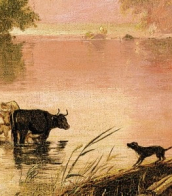

Norman Rockwell was an American illustrator and painter, renowned for his vivid and humane portrayal of American life. Born in New York City in 1894, Rockwell showed artistic promise from an early age, which led him to leave high school and pursue art full-time at prestigious institutions like the National Academy of Design and the Art Students League.
Rockwell's career blossomed early; by the age of 22, he had painted his first cover for The Saturday Evening Post, a relationship that would last nearly five decades and produce 323 covers. His depictions of everyday life and pivotal American moments captured the spirit of the nation.
Perhaps his most significant works were the "Four Freedoms" series, inspired by President Franklin D. Roosevelt's vision of a world founded on four essential human freedoms. These paintings not only graced the covers of The Saturday Evening Post but also played a crucial role in the U.S. war effort during World War II, raising over $130 million through the sale of war bonds.
In his later years, Rockwell did not shy away from addressing social issues. His move to Look magazine allowed him to focus on subjects such as civil rights and poverty, marking a significant shift from his earlier work. "The Problem We All Live With," depicting Ruby Bridges integrating a New Orleans school, remains a powerful symbol of the Civil Rights Movement and showcases Rockwell's ability to engage with contemporary social issues through his art.
For those interested in exploring Rockwell's extensive body of work, the Norman Rockwell Museum in Stockbridge, Massachusetts, holds the largest collection of his original art, providing insights into his artistic journey and the historical context of his works.
If you're keen on further updates and insights into the world of Norman Rockwell, consider signing up for our newsletter. This subscription will keep you informed about new exhibitions, sales, and auction events related to Rockwell's art.
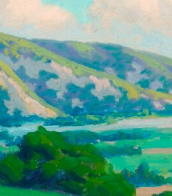

Norman Rockwell was an American illustrator and painter, renowned for his vivid and humane portrayal of American life. Born in New York City in 1894, Rockwell showed artistic promise from an early age, which led him to leave high school and pursue art full-time at prestigious institutions like the National Academy of Design and the Art Students League.
Rockwell's career blossomed early; by the age of 22, he had painted his first cover for The Saturday Evening Post, a relationship that would last nearly five decades and produce 323 covers. His depictions of everyday life and pivotal American moments captured the spirit of the nation.
Perhaps his most significant works were the "Four Freedoms" series, inspired by President Franklin D. Roosevelt's vision of a world founded on four essential human freedoms. These paintings not only graced the covers of The Saturday Evening Post but also played a crucial role in the U.S. war effort during World War II, raising over $130 million through the sale of war bonds.
In his later years, Rockwell did not shy away from addressing social issues. His move to Look magazine allowed him to focus on subjects such as civil rights and poverty, marking a significant shift from his earlier work. "The Problem We All Live With," depicting Ruby Bridges integrating a New Orleans school, remains a powerful symbol of the Civil Rights Movement and showcases Rockwell's ability to engage with contemporary social issues through his art.
For those interested in exploring Rockwell's extensive body of work, the Norman Rockwell Museum in Stockbridge, Massachusetts, holds the largest collection of his original art, providing insights into his artistic journey and the historical context of his works.
If you're keen on further updates and insights into the world of Norman Rockwell, consider signing up for our newsletter. This subscription will keep you informed about new exhibitions, sales, and auction events related to Rockwell's art.


Norman Rockwell was an American illustrator and painter, renowned for his vivid and humane portrayal of American life. Born in New York City in 1894, Rockwell showed artistic promise from an early age, which led him to leave high school and pursue art full-time at prestigious institutions like the National Academy of Design and the Art Students League.
Rockwell's career blossomed early; by the age of 22, he had painted his first cover for The Saturday Evening Post, a relationship that would last nearly five decades and produce 323 covers. His depictions of everyday life and pivotal American moments captured the spirit of the nation.
Perhaps his most significant works were the "Four Freedoms" series, inspired by President Franklin D. Roosevelt's vision of a world founded on four essential human freedoms. These paintings not only graced the covers of The Saturday Evening Post but also played a crucial role in the U.S. war effort during World War II, raising over $130 million through the sale of war bonds.
In his later years, Rockwell did not shy away from addressing social issues. His move to Look magazine allowed him to focus on subjects such as civil rights and poverty, marking a significant shift from his earlier work. "The Problem We All Live With," depicting Ruby Bridges integrating a New Orleans school, remains a powerful symbol of the Civil Rights Movement and showcases Rockwell's ability to engage with contemporary social issues through his art.
For those interested in exploring Rockwell's extensive body of work, the Norman Rockwell Museum in Stockbridge, Massachusetts, holds the largest collection of his original art, providing insights into his artistic journey and the historical context of his works.
If you're keen on further updates and insights into the world of Norman Rockwell, consider signing up for our newsletter. This subscription will keep you informed about new exhibitions, sales, and auction events related to Rockwell's art.


Norman Rockwell was an American illustrator and painter, renowned for his vivid and humane portrayal of American life. Born in New York City in 1894, Rockwell showed artistic promise from an early age, which led him to leave high school and pursue art full-time at prestigious institutions like the National Academy of Design and the Art Students League.
Rockwell's career blossomed early; by the age of 22, he had painted his first cover for The Saturday Evening Post, a relationship that would last nearly five decades and produce 323 covers. His depictions of everyday life and pivotal American moments captured the spirit of the nation.
Perhaps his most significant works were the "Four Freedoms" series, inspired by President Franklin D. Roosevelt's vision of a world founded on four essential human freedoms. These paintings not only graced the covers of The Saturday Evening Post but also played a crucial role in the U.S. war effort during World War II, raising over $130 million through the sale of war bonds.
In his later years, Rockwell did not shy away from addressing social issues. His move to Look magazine allowed him to focus on subjects such as civil rights and poverty, marking a significant shift from his earlier work. "The Problem We All Live With," depicting Ruby Bridges integrating a New Orleans school, remains a powerful symbol of the Civil Rights Movement and showcases Rockwell's ability to engage with contemporary social issues through his art.
For those interested in exploring Rockwell's extensive body of work, the Norman Rockwell Museum in Stockbridge, Massachusetts, holds the largest collection of his original art, providing insights into his artistic journey and the historical context of his works.
If you're keen on further updates and insights into the world of Norman Rockwell, consider signing up for our newsletter. This subscription will keep you informed about new exhibitions, sales, and auction events related to Rockwell's art.


Norman Rockwell was an American illustrator and painter, renowned for his vivid and humane portrayal of American life. Born in New York City in 1894, Rockwell showed artistic promise from an early age, which led him to leave high school and pursue art full-time at prestigious institutions like the National Academy of Design and the Art Students League.
Rockwell's career blossomed early; by the age of 22, he had painted his first cover for The Saturday Evening Post, a relationship that would last nearly five decades and produce 323 covers. His depictions of everyday life and pivotal American moments captured the spirit of the nation.
Perhaps his most significant works were the "Four Freedoms" series, inspired by President Franklin D. Roosevelt's vision of a world founded on four essential human freedoms. These paintings not only graced the covers of The Saturday Evening Post but also played a crucial role in the U.S. war effort during World War II, raising over $130 million through the sale of war bonds.
In his later years, Rockwell did not shy away from addressing social issues. His move to Look magazine allowed him to focus on subjects such as civil rights and poverty, marking a significant shift from his earlier work. "The Problem We All Live With," depicting Ruby Bridges integrating a New Orleans school, remains a powerful symbol of the Civil Rights Movement and showcases Rockwell's ability to engage with contemporary social issues through his art.
For those interested in exploring Rockwell's extensive body of work, the Norman Rockwell Museum in Stockbridge, Massachusetts, holds the largest collection of his original art, providing insights into his artistic journey and the historical context of his works.
If you're keen on further updates and insights into the world of Norman Rockwell, consider signing up for our newsletter. This subscription will keep you informed about new exhibitions, sales, and auction events related to Rockwell's art.


Norman Rockwell was an American illustrator and painter, renowned for his vivid and humane portrayal of American life. Born in New York City in 1894, Rockwell showed artistic promise from an early age, which led him to leave high school and pursue art full-time at prestigious institutions like the National Academy of Design and the Art Students League.
Rockwell's career blossomed early; by the age of 22, he had painted his first cover for The Saturday Evening Post, a relationship that would last nearly five decades and produce 323 covers. His depictions of everyday life and pivotal American moments captured the spirit of the nation.
Perhaps his most significant works were the "Four Freedoms" series, inspired by President Franklin D. Roosevelt's vision of a world founded on four essential human freedoms. These paintings not only graced the covers of The Saturday Evening Post but also played a crucial role in the U.S. war effort during World War II, raising over $130 million through the sale of war bonds.
In his later years, Rockwell did not shy away from addressing social issues. His move to Look magazine allowed him to focus on subjects such as civil rights and poverty, marking a significant shift from his earlier work. "The Problem We All Live With," depicting Ruby Bridges integrating a New Orleans school, remains a powerful symbol of the Civil Rights Movement and showcases Rockwell's ability to engage with contemporary social issues through his art.
For those interested in exploring Rockwell's extensive body of work, the Norman Rockwell Museum in Stockbridge, Massachusetts, holds the largest collection of his original art, providing insights into his artistic journey and the historical context of his works.
If you're keen on further updates and insights into the world of Norman Rockwell, consider signing up for our newsletter. This subscription will keep you informed about new exhibitions, sales, and auction events related to Rockwell's art.

